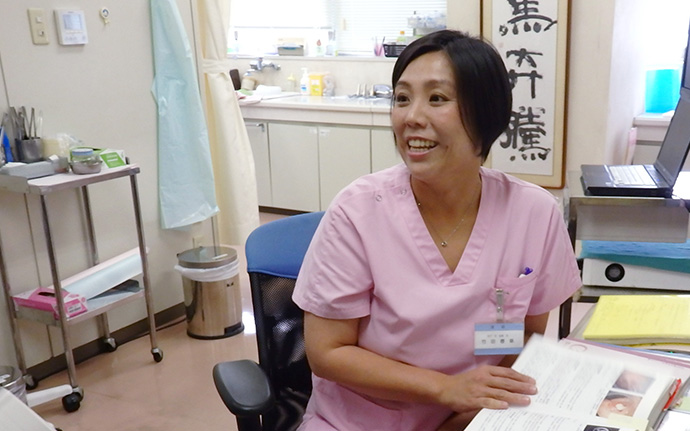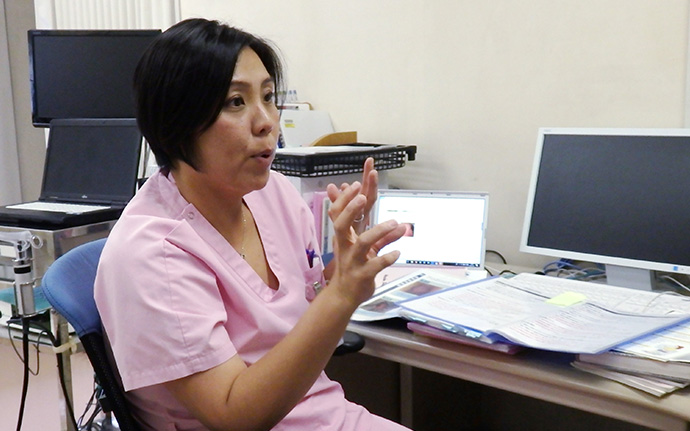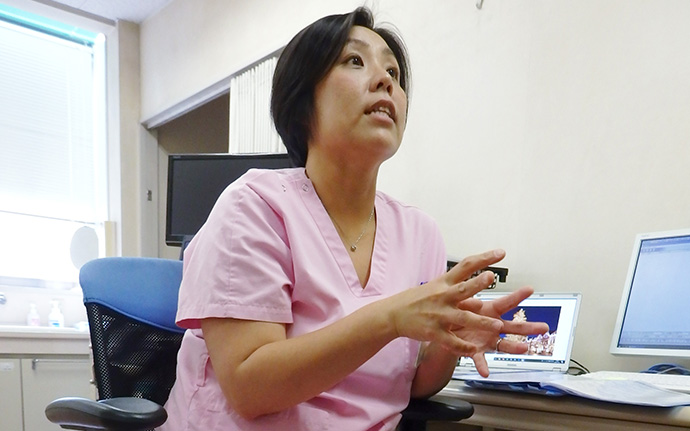
OTC drugs for hemorrhoids used during pregnancy vary depending on gestational week. Nonsteroidal drugs in prefilled disposable applicators for hemorrhoids are recommended for patients before reaching the stable stage of pregnancy. Consult a physician or pharmacist before use.
At our hospital, steroids are used for pregnant patients during the period from the stable stage of pregnancy to childbirth. Steroids are not used during any gestation period other than the above-mentioned. As for oral drugs, laxatives such as magnesium oxide and Daikenchuto (Kampo formulation) will be prescribed; however, basically, oral drugs to prevent hemorrhoid swelling will not be prescribed. Pregnant women should be cautious about taking even only a single dose of a common cold medication. In my opinion, pregnant women must select a drug only after discussing various options with a physician.

Constipation can be classified into rectal or atonic constipation, but in communication with my patients, I avoid using medical terminology. I try to give patients advice based on symptoms such as "at what intervals they have bowel movements," "whether stools reach the anal canal but are not evacuated" and "whether they have hard or soft stools." I give patients an explanation using expressions that are easy to understand, such as "they should drink adequate fluid" for patients with hard stools and "they should do exercise" for patients with intestinal hypomotility.
Improvement of lifestyle is important in the treatment of constipation. I recommend to form the habit of not going to bed late and arising at a sensible time. In humans, a happiness hormone called “serotonin” is secreted from the small intestine; the secretion of this hormone is facilitated by exposure to the morning sunlight. Taking the morning sunshine and telling yourself "you will have a good day!” will help in making the bowels function well.
There are more than a few patients who constantly use laxatives despite not having constipation, mistakenly assuming that “they are constipated.” Even if there are days without a bowel movement, it is not considered constipation. Although it is ideal to have a bowel movement at the same time every day, there is no problem with a bowel movement every 2 or 3 days if the patient passes stools smoothly without feeling a sensation of inadequate defecation. There are patients who visit our hospital, saying "they want to stop using OTC drugs for constipation." Some patients suffer from diarrhea due to excessive use of laxatives. Such patients have a sensation of inadequate defecation and rough skin around the anal region. We advise such patients to improve their lifestyle, to stop using OTC drugs, and to use only oral prescription drugs, which can be well tolerated if continuously taken. However, when constipation does not subside soon after discontinuation of OTC drug use and there is no response after taking an oral prescription drug for 3 days, we recommend taking one dose of the previously used OTC drug and encouraging the patient, saying "you will have more frequent bowel movements or more stools evacuated compared with previously." It is important for patients to have confidence that “they can achieve regular bowel movements.”
Constipation can cause rough skin and perianal problems, which is detrimental to health. There are many people suffering from a mental condition involving "constipation and depression" in which they think about the presence or absence of a bowel movement all day after awakening every morning: e.g., "Will I have a bowel movement today?" or " Will I have a bowel movement after eating this food?" Some patients complain that "they are making various efforts to have a bowel movement; therefore, they do not know why they have no bowel movement!” However, it is advisable not to be too much concerned about constipation. Eating less due to lack of bowel movements decreases the bulk of stools, which is counterproductive. There is no problem if you have bowel movements once every 2 to 3 days and the form of stools appears to be normal. It is recommended to think that "there is no bowel movement today but there will be a bowel movement the following day." If you have any concerns about bowel movements, visit a hospital. Checking the color of stools is always recommended. A healthy person passes ocher stools, but a person with any abnormality in the stomach and/or intestines may pass blackish stools due to digestive tract bleeding or may pass red bloody stools. Patients will be asked specifically about anal bleeding, whether bleeding occurs during every defecation, whether no bleeding is observed sometimes, and whether blood loss during defecation is substantial. Patients with upper gastrointestinal bleeding pass blackish stools, while patients with lower gastrointestinal bleeding pass reddish stools. Both colorectal cancer and hemorrhoids can cause anal bleeding. If anal bleeding persists, do not hesitate to consult a physician.

OTC laxative drugs are widely available; however, it is recommended not to take irritant laxatives every day. Caution must be exercised not to “increase the doses of laxatives due to lack of bowel movements.” Always follow the specified dosage and administration.
Attention must be paid to the fact that not only drugs but also diet tea contains irritating ingredients. If you drink too much diet tea, the intestines may become dark in color and intestinal motility may decrease, which is also detrimental to the anal region. Although diet tea is convenient, excessive intake of it poses risks. Caution should be exercised.
Among patients who take prescribed irritant laxatives, there are some patients taking more than one irritant laxative or an irritant laxative at a dose higher than the specified dose. At our hospital, we experienced a case in which constipation was cured 2 weeks after a patient, who had been taking five types of irritant laxatives, reduced the number of laxatives from five to one. First of all, drug dependence must be broken.

Hemorrhoids may develop suddenly even in patients who have been asymptomatic, and emergency surgery may be required in some cases. Therefore, it is difficult to judge whether the patient’s condition requires medical treatment based only on the duration of constipation. It is recommended to consult a physician when any hemorrhoids symptoms occur, not based on the duration of constipation. If there is any anal discomfort, pain, bleeding or such, a physician must be consulted. Anorectal examinations can be performed in outpatient settings. In order not to overlook the possibility of rectal cancer, consult a physician promptly if any such symptoms occur.
As a simple measure against hemorrhoids, it is recommended for patients to immerse themselves in a bathtub to relax and warm the perianal region. Hemorrhoids cause throbbing pain and patients tend to think that they should not take a bath. However, for patients with hemorrhoids, immersing themselves in a bathtub to warm the affected area is recommended rather than just taking a shower. Excessive straining on the toilet must also be avoided. Go to the toilet promptly when you feel a sensation of urgency to defecate, and pass stools. Even if you have a sensation of inadequate defecation, leave the toilet soon after defecation. Do not go to the toilet with a smartphone or newspaper in hand.
I understand that people suffering from hemorrhoids, especially women, may feel embarrassed to visit a proctology clinic/hospital. Recently, the number of female proctologists has been increasing. We proctologists also think that we can support or encourage patients suffering from hemorrhoids. If you have any concerns, visit a proctology clinic/hospital.
Pregnant women search the Internet for information about anal problems during pregnancy and about childbirth; however, it must be remembered that not all of the information is reliable. For pregnant women who are concerned about anal problems and collecting information using the Internet, it is more important to consult a physician. Pregnant women who want to use a laxative for constipation should first consult their obstetrician-gynecologists. However, women who are planning to become pregnant, tell the physician that they wish to become pregnant at the first visit to the hospital. The taking of any drug by a woman in early pregnancy should be avoided to alleviate any concern that the woman may have later about the effect of the drug as her pregnancy progresses. At our hospital, patients are asked if they wish to become pregnant or plan to become pregnant in the questionnaire on their medical history. Based on the information in the questionnaire, we can prescribe drugs appropriately according to patients’ circumstances. People who are to use an OTC drug for constipation because they cannot visit a hospital due to unavoidable circumstances should select a drug suitable to their conditions after consultation with a pharmacist.
